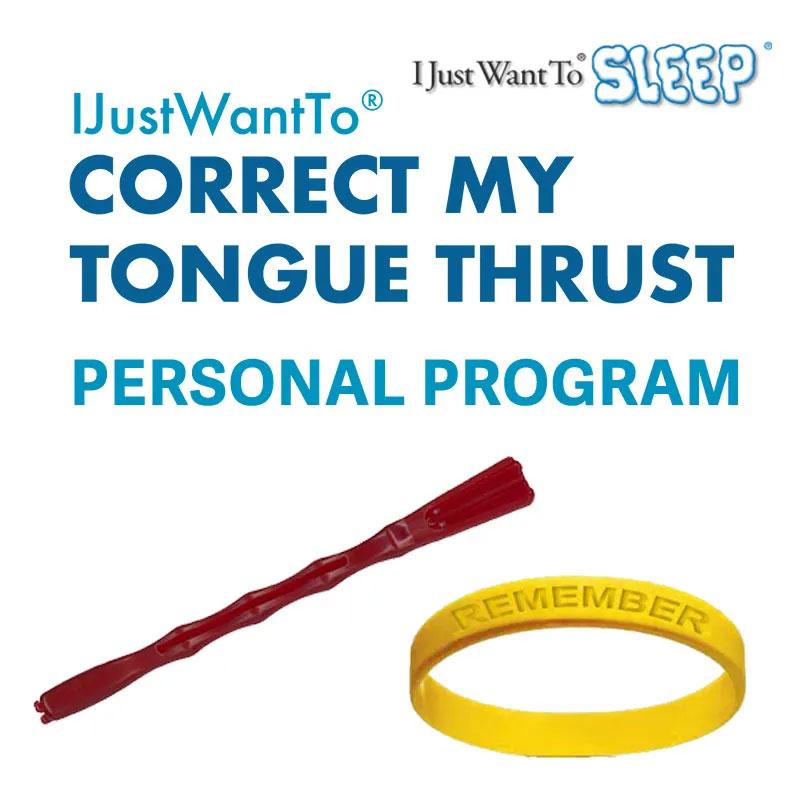At IJustWantTo Correct My tongue Thrust, we meet a lot of people who say, “I just want to stop snoring.” They are often surprised to learn that tongue thrust is a common culprit causing your snoring issue. In this article, we are discussing tips for eliminating snoring from your life which includes identifying and correcting tongue thrust.
Here are 5 Tips for Those Who Just Want to Stop Snoring.
1) Adjust the position in which you sleep
Do you sleep on your back? If so, your sleep position may be contributing to your snoring. While on your back, your tongue and soft palate fall to the back of your throat, so that when you breathe, it sounds like someone is trying to start a chainsaw in the middle of the night. Begin to take steps to train yourself to sleep on your side, whether it is hugging a body pillow or putting something behind your back so you cannot roll over in the night.
2) Diet and exercise
If you have recently gained weight or typically drink alcohol near bedtime, these can cause you to snore at night. Eating nutritious meals, avoiding alcohol before bed, and getting plenty of exercises can help you reduce the occurrence of snoring.
3) Change your nighttime routine
Do you work till you drop? Do you watch a lot of television until you fall asleep? Do you like to get a nighttime snack before your head hits the pillow? If you have poor bedtime habits, they can contribute to snoring and fatigue. Having a healthy, proper bedtime routine that includes proper hygiene, time to settle your thoughts, and as much darkness as possible will help you sleep better and often reduce snoring.
4) Find out if you have sleep apnea
Your snoring may be a result of sleep apnea. Sleep apnea is a condition that describes frequent starts and stops in a person’s breathing while they are sleeping. If you have frequent snoring issues, it could indeed be a result of sleep apnea, which can be potentially dangerous. Talk to your doctor about having a sleep study to discover if you do have sleep apnea. You may need to begin using a CPAP machine, but your doctor can advise on this.
5) Correct your tongue thrust
Tongue thrust is a term used to describe what happens when your tongue pushes against your front teeth when you are at rest or swallowing.
We are all born with a tongue thrust reflex which should naturally stop around the age of 12 months. Here are some examples of why the tongue thrust does not disappear “on its own”.
- If the child continues past this age to suck their thumb/fingers, pacifier, or bottle, continued repetition of thrusting the tongue forward can result in a new habit.
- If the child loses their front baby teeth prematurely, then the child’s tongue has no boundary to encourage their tongue to stay inside their mouth, or the child “plays” with the gum where the lost tooth used to be and this encourages the tongue to stay too far forward in their mouth. The loss of baby teeth prematurely can be due to a lot of cavities, requiring that they have to be pulled by a dentist, or by an accident that knocks their front teeth out.
- If the child has enlarged tonsils and adenoids, their tongue can literally be pushed forward because those enlarged tonsils and adenoids are taking up part of the space in the back of the mouth. The only direction the tongue can go is out!
- If the child has a chronic stuffy nose, they must breathe through their mouth, which allows the tongue to spread out more, usually protruding or “living” near their front teeth.
Any of the above possibilities is not only making the tongue thrust habitual but it is also will result in mouth breathing. Mouth breathing can then lead to snoring and possibly sleep apnea. Let’s not forget that all of this began with a tongue thrust, which can be successfully treated by a professional.
What can you do about your tongue thrust?
At IJustWantToCorrect my tongue thrust, we have developed a seven-week course to help you retrain your tongue’s position in your mouth. This can eliminate tongue thrust and train you to breathe through your nose instead of your mouth, preventing you from snoring which should then prevent progression to sleep apnea. That means you and your loved ones can sleep better and have more energy each day. So why wait? Contact IJustWantTo Correct My Tongue Thrust today to find out more about our program, or just visit our website and order.



